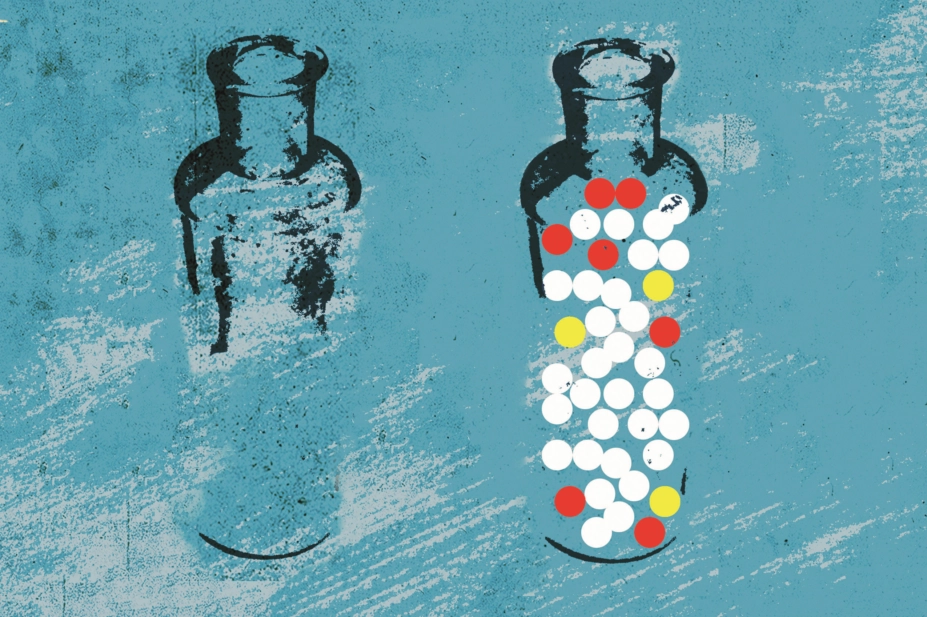
Lee Woodgate / Alamy
In June 2018, the High Court dismissed the British Homeopathic Association’s case and upheld the decision to stop NHS prescribing of homeopathic remedies in England. It was the end of a long-running saga over homeopathic products manufactured in a process that produces highly diluted solutions, where none of the original active ingredients remain.
But should homeopathic remedies still be available for purchase in community pharmacy? Two pharmacists go head-to-head to debate whether this is a matter of patient choice, or an immoral distraction.
-
Yes: it’s better to buy them from us, rather than disreputable sources says Sibby Buckle, pharmacist and member, English Pharmacy Board, Royal Pharmaceutical Society
-
No: selling homeopathic remedies discredits the pharmacy profession says Terry Maguire, community pharmacist, Northern Ireland
Yes: it’s better to buy them from us, rather than disreputable sources

Sibby Buckle, pharmacist and member, English Pharmacy Board, Royal Pharmaceutical Society
This is, quite rightly, a controversial area. Some say “under no circumstances whatsoever” should homeopathic remedies be sold from pharmacies. But others say “we must honour the patient’s right to choose”.
I do not believe there is good scientific evidence to validate homeopathic remedies as medicines, but it is important to provide patients with choice in an informed environment — pharmacists and pharmacy teams are able to provide this expertise.
It is better for the public to buy these products from a reputable source where the community pharmacist — the expert on medicines — can provide professional advice, which is not available from unregulated online suppliers or other non-healthcare outlets.
Homeopathy supposedly works on the basis of like treating like, but the ‘active ingredient’ is provided in an extremely dilute solution. In fact, the remedies are so dilute that none of the original ingredients remain. Apparently, through succussion (or shaking) the water molecules retain memory of the active ingredient and elicit an effect — dubious science. But the important and often-forgotten aspect of homeopathy is its treatment of the whole person, not just the person’s symptoms. A homeopathic appointment can last 45 minutes, unlike the standard 10 minutes with a GP. So it is no wonder that patients feel better — they have just had a counselling session.
So, I’m not here to argue the science: I argue that some people can benefit from homeopathy.
We ought to explore homeopathy’s placebo effect. Placebos are often dismissed as fakes, but they seem to act on the same brain pathways that are targeted by ‘real’ treatments. I wonder whether, through the placebo effect, homeopathy has a role to play in mental health treatment and pain relief. Whether for anxiety, mild-to-moderate depression, sleeplessness or stress, taking a little white tablet may benefit the patient, have fewer side effects than conventional medication, cause no harm, and is better than an excess of alcohol or illegal drugs.
Of course, homeopathy should not replace conventional medicines, and people should continue to be vaccinated, should use their inhalers and take their insulin. Homeopathy should not be funded on the NHS, but we do not live in a nanny state.
The clinical efficacy of many other products sold in the pharmacy is also questionable, but we still provide them. One example is guaifenesin for chesty coughs, which provides a suboptimal dose at over-the-counter strength. Many people are sceptical of the benefits of vitamin and mineral supplements. Bach flower remedies claim to tackle stress. We drink herbal tea for its ‘health’ benefits or buy fortified cereals because they are ‘better for you’, but these benefits are not clinically proven.
If the public finds comfort in a complementary therapy — whether it is acupuncture, reflexology, vitamins or homeopathy — I am happy to offer that choice, as long as the chosen therapies do no harm, and people continue to take their prescribed medicines.
If the patient wants my professional advice, I will explain that homeopathic medicines are not clinically proven but they may help certain conditions. I will probably recommend a different product, but at least I am there to do so.
You will not find a pharmacist in a health shop or on the internet, but in the community pharmacy you will find a highly qualified medicines expert, who will advise and inform, and who truly cares about the public’s health.
- This is a personal view and should not be seen as the policy position of the RPS.
No: selling homeopathic remedies discredits the pharmacy profession

Terry Maguire, community pharmacist, Northern Ireland
Some years ago, I seriously considered the formation of a new professional body, ‘Pharmacists for Science’, with the single aim of promoting science among colleagues. Just like ‘Vicars for God’, ‘Police for the Law’ and ‘Teachers for Education’, there should be no need for such an initiative. But given pharmacy’s heavy promotion of homeopathy, I feared that the profession was in danger of losing science as its bedrock.
Around that time, in 2009, a London-based pharmacy was supplying a homeopathic ‘swine flu formula’. This was a dangerous practice but government agencies failed to regulate it effectively or to close it down.
In 2010, the then professional standards director at Boots, Paul Bennett (now chief executive, Royal Pharmaceutical Society), appeared before the Science and Technology Committee in its discussion of homeopathy’s availability on the NHS. Bennett stood by the sale of homeopathic remedies in Boots’ stores: “It is about consumer choice for us,” he said. I disagree with this argument.
Like the sale of cigarettes in US pharmacies, homeopathy threatens to fatally damage the reputation of community pharmacy. Pharmacies that sell homeopathic remedies give them unjustified credibility. Informed patient choice should be king; if pharmacists, pharmacy staff and shelf-barkers fail to clearly inform customers that homeopathic remedies are no more effective than placebo, we have acted unethically.
Yet Boots, perhaps alarmed by the number of subsequent protests against homeopathy outside its stores, got the message. Its website now reflects a more scientific approach: Boots states that the homeopathic remedies it supplies are “without approved therapeutic indications”. Boots also seems to have modified its range and offering of homeopathic remedies. So there is hope for community pharmacy.
Homeopathic remedies are still sold in pharmacies only because they make a profit. Sales in pharmacy are nonsense because, as most homeopathic practitioners claim, it is not possible to sell homeopathic remedies in isolation of a homeopathic consultation. The consultation determines the remedy. Off-the-shelf homeopathy is a relatively recent phenomenon.
The remedies are no more effective compared with placebo, anyway. Systematic reviews from the Cochrane Library — the gold standard of medical science — have considered homeopathy in the treatment of dementia, asthma and attention deficit hyperactivity disorder, all of which have confirmed the placebo effect[1]
,[2]
. Irritatingly, supporters of homeopathy will always, in any debate, quote a bunkum study that shows some possible efficacy. Some might argue that placebo, or suggestion, is effective therapy, so why not use it? We must question the ethics of this approach.
Pharmacists act immorally when they sell the products without making clients aware that homeopathy does not work.
I never did form the professional body ‘Pharmacists for Science’ — I find that most pharmacists, when asked, appreciate that homeopathy has no scientific basis and provides merely a placebo effect. I sincerely hope that with this insight, pharmacy will finally clear its shelves of this expensive hocus pocus for good.
Want to shape worldwide policy on pharmacy’s relationship with homeopathy? Don’t miss ‘Homeopathy in pharmacies: the great debate’ on 4 September 2018 at the 78th International Pharmaceutical Confederation (FIP) World Congress in Glasgow. Practising pharmacists are encouraged to share their opinions, which will steer FIP’s position on providing homeopathic products in the pharmacy.
References
[1] Shang A, Huwiler-Müntener K, Nartey L et al. Are the clinical effects of homeopathy placebo effects? Comparative study of placebo-controlled trials of homeopathy and allopathy. Lancet 2005;366(9487)726–732. doi: 10.1016/S0140-6736(05)67177-2
[2] Ernst E. A systematic review of systematic reviews of homeopathy. Br J Clin Pharmacol 2002;54(6):577–582. PMCID: PMC1874503


